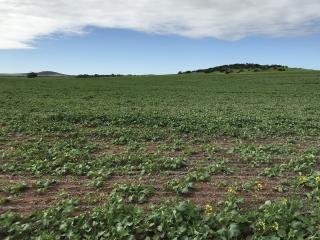Plant samples needed for national survey of root diseases and pests of pulses and legumes

A national survey of root diseases and pests of pulses and oilseeds underway and DPIRD researchers Carla Wilkinson, Dominie Wright and Miriam Connor are putting out a request for plant samples from growers and agronomists. Samples are needed from the following crops; canola, lupins, chickpea, field pea, lentil, vetch and faba bean.
Soil borne pathogens often occur in disease complexes and the most damaging pathogens may be difficult to isolate. If the main pathogen is not detected it won’t be considered when management strategies are being developed.
PREDICTA® B, developed by SARDI Molecular Diagnostic Centre, and visual examination of samples is useful for monitoring known pathogens in the field. However, if a test is not available or we are not aware of what pathogens to look for then it may not be detected. This project aims to identify the pathogens most commonly associated with poorly performing pulses and legumes and also to identify previously unrecognised pathogens using next generation sequencing.
Prioritising which tests to develop and include in PREDICTA B is guided by experienced pathologists nationally.
Knowledge of the root diseases in Australian pulse and oilseed crops is limited. As frequency of these crops increase, the risk from soil-borne diseases also increases. If we identify potentially important pathogens by sequencing, we will use your dried root sample to isolate a pure culture and infect plants in pot experiments to confirm pathogenicity (using Koch’s postulates).
How can you help with this research?
If you notice a pulse or oilseed crop (a) with poor establishment or (b) growing poorly in winter/spring then please contact DPIRD Technical officer Miriam Connor on +61 (0)8 9368 3579 for a sampling kit, which includes sampling instructions, sample bags with labels (that must be completed with sample details) and a pre addressed Express Post bag to send the sample to DPIRD’s Diagnostic Laboratory Services (DDLS) as soon as possible after collection. Timing is important as mould can make a sample unusable.
Sampling Instructions
Samples may be collected during crop establishment or in late winter/early spring.
- Poor crop establishment samples (3 to 5 weeks after germination)
- Identify poor performing areas within the crop suspected to be caused by root disease.
- Use spade to dig a total of 24 plants from 3 to 6 poor performing areas. Push spade down vertically more than 10cm before lifting plants to ensure majority of the root system is collected.
- Gently remove loose soil from roots, wrap plants with remaining attached soil in the paper towel provided and place in barcoded sample bag, fold bag, complete sample details, then place in the Express Post Satchel and post to local DPI Lab as soon as possible.
- Poor performing crop samples (winter/early spring)
- Identify poor performing areas within the crop suspected to be caused by root disease.
- Use spade to sample a total of 12 plants within the outer areas of 3 to 5 poor performing areas within the crop. Push spade down vertically to at least 10cm before lifting plants to ensure majority of the root system is collected.
- Remove plant tops, 5 cm above crown.
Gently remove loose soil from roots, wrap plants and remaining attached soil in the paper towel provided and place in barcoded sample bag, fold bag, complete sample details, then place in the Express Post Satchel and post as soon as possible.
When the sample is received the roots will be carefully washed, photographed and rated for damage. After drying, the samples will be sent to SARDI for molecular testing using two methods. First, samples will be analysed using the pulse research panel which tests for several known pulse pathogens; results will be communicated free of charge to whoever took the sample. Samples will also be analysed using next generation sequencing to identify new or emerging pathogens. This will give agronomists and growers’ knowledge of what may be impacting their crop and can assist in future management decisions.
This work is in collaboration with GRDC and is part of a new project called ‘Soilborne Diseases Interaction’ (DJP1907-002RMX).
For more information on this project and sampling please contact South Perth DPIRD officers Miriam Connor on +61 (0)8 9368 3579, Carla Wilkinson on +61 (0)8 9368 3862 or Dominie Wright on +61 (0) 9368 3875.
